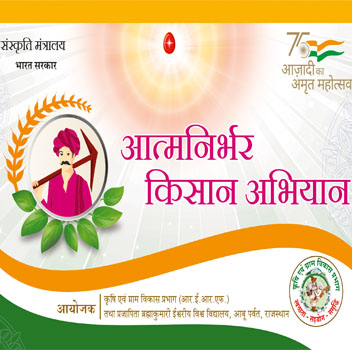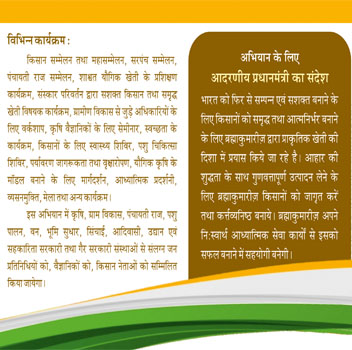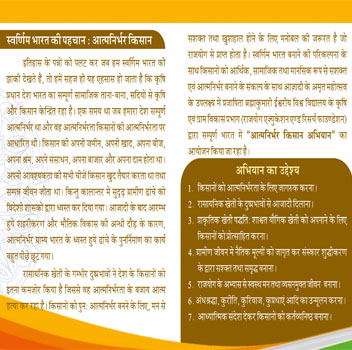Farmers Experience

Name of the farmer : B.K. Balasaheb Shripal Ruge
Age : 37 years
Village : Ichalkaranji
Dist : Kolhapur
State : Maharashtra
I am a regular student of Prajapita Brahmakumari Ishwariya Vishwa Vidyalaya, Ichalkaranji centre of district Kolhapur . I have been practicing Meditation for last 8 years. I have four acres land for farming, from which I planted sugarcane crop in 13 Aar field on 5th September, 2006. The inspiration and guidance for practising Rajayoga in farming was given by sister Manisha, in-charge of Kurundvad sub-center.
Then I started the experiment of practising rajyoga on my crop. Everyday I would practise Rajyoga meditation and address my crop. While practising Rajyoga, I used to feel that the Supreme Father, Supreme Soul, the ocean of - knowledge, love , peace, bliss, happiness, purity and power- is with me and showering all his vibrations on me and through me they are dissipated around me and on the crop. I regularly made my farm emerge before me from 4-00 a.m. to 5-00 a.m. in the morning.
Even while working in the farm I practised Rajyoga. I used to spread the rays of eternal qualities of soul ( peace, love, purity etc.) on the crop everyday from 4.30 to 5.00 a.m., i.e. the period of Amritvela. I also made all the pious qualities of nature emerge before me. While working in the farm we remained in sweet remembrance of Supreme Soul God Shiva. Seven-eight brothers and sisters of Takvade class did meditation for ½ hour once in a month at my farm. I observed that by practicing Rajayoga meditation, the yield of the crop of sugarcane increased, and the quality also got better in comparison to the sugarcane yield of the previous year (which was produced by chemical fertilizer) . During this experiment I used cow urine, cow dung , ozotobector and phosphorous P.S.B. Culvar for sugarcane in place of chemical fertilizer. I also used grain slurry thrice and once grain kheer. To protect the sugarcane crop from wooly aphids, I, instead of using chemical insecticides, applied filtered slurry of one Kg. cow dung and 1 litre water in the morning hours. I took 75 ml. of water from it and 50 ml. of cow urine and sprinkled it through spray pump by mixing it in 15 litres of water. I sprinkled this type of mixture two times in June and August, 2007. I reaped this crop in January, 2008. The total yield was about 21 metric tons (21000 Kg.).
My total expense were of RS. 2964 /- that included ploughing seeds of sugarcane and for spraying the above mentioned organic fertilizer and organic material etc. Earlier, I had got only 16 Metricstons (16000 Kg. ) of sugarcane output from the same farm but the total expense of using chemical fertilizer was RS. 5900/- . I saved about RS. 3000/- in 13 aar field by applying Yogic Vibrations and organic fertilizer and I gained additional 5 metrics tons (5000 Kg.) of sugarcane.
My personal opinion is that Shashwat Yogic Kheti ( Sustainable Yogik Agriculture ) is a very good method of farming . Our lifestyle takes an upward turn year after year. The old concept of �Jivo Jeevasya Jeevanam� i.e. a life form survives by devouring another life form and also �Jeev Jeevaat Jaayate� i.e. a life form comes to life from another life form. This cycle has been going on for ages. However, in the present case there is no need to kill any insects. We get good crop and the crop is also of high quality. By practising Rajayoga Meditation, our mind also becomes healthy along with improvement in the crop. Such is my personal experience.
Click on the names of other farmers to read their experiences:-
B.K. Bholanath ShivlingaB.K. Tulsibhai




 Dadi Hridaya Mohini Chief of Brahma Kumaris
Dadi Hridaya Mohini Chief of Brahma Kumaris
“This methodology is very essential to produce pure & pious food, fruits & vegetables for good health. My good wishes are always with the farmers following yogic agriculture methodology by experimentation of Rajyoga Meditation, preperation of Organic Manures, adopting various ancient methods of conservation of crops - which will result in achieving 100% success.”
B.K. Sarla
Chairperson Agriculture and Rural Devp. Wing
“This is a farming process based on Rajyoga Meditation, which will have its valuable contribution in the creation of the new age. I express my best wishes to all the farming community for adopting this sustainable yogic methodology.”
 B.K. Raju Vice-Chairman Agriculture and Rural Devp. Wing
B.K. Raju Vice-Chairman Agriculture and Rural Devp. Wing
“
This novel project will guide the farmer brothers & sisters all around the world & inspires them for a life style filled with total bliss & peace. It leads to imperishable prosperity by means of holistic & healthy crop production. I wish you all the success, which is your birthright.”
COMPARATIVE STUDY
In Chipri Village of Shirol Tehseel, in the Kolhapur District of Maharashtra State, Farmers made a comparative study of the difference between the Yogic Farming process and the Chemical Farming on the crop of Tomatoes. The experiment was done on the Namdhari 2535 breed of tomatoes. The crop from the both the experiments were sent for analysis in the research laboratory.
The analysis shown that the yogic process in comparison to the chemical saves a sum total of about Rs. 14769.00 per acre and as the expenses under the Yogic process is extremely low, the profit margin of the Yogic process is higher by about Rs. 6290.00. The quality of the organic process is better than that of the inorganic of chemical process. It can be easily said that the expenses under the yogic process are low and the profit is more in comparison to the chemical process. Small farmers will not have to borrow money from money lenders and the best of all the benefits is that the crop (fruits, vegetables etc) through the yogic process makes mind and body healthy.
